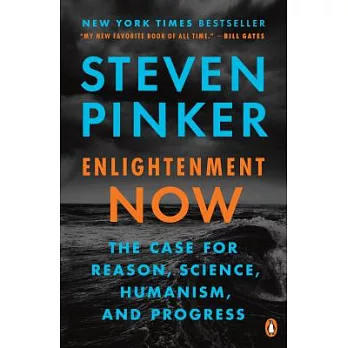啟蒙運動不停歇,人類世界更進階
振奮所有對現況焦慮、困惑的人,一同秉持啟蒙信念,邁向啟蒙時代2.0!
打破被政客、媒體灌輸的偏見
這世界,其實遠比你想像的更美好
哈佛心理學教授史蒂芬‧平克於廣受迴響前作《人性中的良善天使》中,討論暴力隨著時代演進逐漸減少。《Enlightenment Now》則延伸人類發展的宏偉藍圖:活得更久、更健康、更自由、更幸福。秉持啟蒙運動以來善用理性與科學的態度,再艱鉅的問題都能迎刃而解。
世界真的要崩毀了嗎?進步的理想是否過時了?哈佛心理學教授史蒂芬‧平克敦促我們從血腥頭條與滅絕預言中抽身出來,這些都形成我們的心理偏見。相反地,相信以下數據:平克透過75張驚人的圖表,顯示生命、健康、繁榮、安全、和平、知識與快樂的增長不只在西方,在全球均扶搖而上。這些進展不是什麼宇宙力量的結果,是啟蒙運動的成果,證明:理性和科學,的確可以促進人類繁榮。
時間驗證了啟蒙運動並非天真的願望,而是有效的方法。但現今比以往更需要堅強的防禦。啟蒙運動計畫對抗時下煽動者(像是蠱惑民心的政客)樂於利用的種種伎倆—部落主義、獨裁主義、妖魔化、神奇思維。不讓腐蝕性的宿命論破壞自由民主,以及全球機構合作的寶貴空間。
兼具深度理性與文學才華,《Enlightenment Now》是我們以理性、科學與人文為理念,面對問題並繼續前進的理想。
「了不起的著作... 敘述了從健康到戰爭、環境到快樂、平等權到生活質量等廣泛指標的進步。」–《紐約時報》評論
【文/博客來編譯】
INSTANT NEW YORK TIMES BESTSELLER
A NEW YORK TIMES NOTABLE BOOK OF 2018
ONE OF THE ECONOMIST''S BOOKS OF THE YEAR
"My new favorite book of all time." --Bill Gates
If you think the world is coming to an end, think again: people are living longer, healthier, freer, and happier lives, and while our problems are formidable, the solutions lie in the Enlightenment ideal of using reason and science.
Is the world really falling apart? Is the ideal of progress obsolete? In this elegant assessment of the human condition in the third millennium, cognitive scientist and public intellectual Steven Pinker urges us to step back from the gory headlines and prophecies of doom, which play to our psychological biases. Instead, follow the data: In seventy-five jaw-dropping graphs, Pinker shows that life, health, prosperity, safety, peace, knowledge, and happiness are on the rise, not just in the West, but worldwide. This progress is not the result of some cosmic force. It is a gift of the Enlightenment: the conviction that reason and science can enhance human flourishing.
Far from being a na ve hope, the Enlightenment, we now know, has worked. But more than ever, it needs a vigorous defense. The Enlightenment project swims against currents of human nature--tribalism, authoritarianism, demonization, magical thinking--which demagogues are all too willing to exploit. Many commentators, committed to political, religious, or romantic ideologies, fight a rearguard action against it. The result is a corrosive fatalism and a willingness to wreck the precious institutions of liberal democracy and global cooperation.
With intellectual depth and literary flair,
Enlightenment Now makes the case for reason, science, and humanism: the ideals we need to confront our problems and continue our progress.



 天天爆殺
天天爆殺  今日66折
今日66折 























 博客來
博客來 博客來
博客來 博客來
博客來 博客來
博客來 博客來
博客來